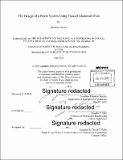The design of a power system using treated aluminum fuel
Author(s)
Slocum, Jonathan (Jonathan T.)
DownloadFull printable version (11.44Mb)
Other Contributors
Massachusetts Institute of Technology. Department of Mechanical Engineering.
Advisor
Douglas P. Hart.
Terms of use
Metadata
Show full item recordAbstract
Aluminum is the most abundant metal in the Earth's crust and a highly sought after fuel source due to its extreme energy density. It has the ability to produce large quantities of hydrogen and heat when reacted with water making it an attractive fuel for underwater vehicles and ocean sensor platforms. The biggest challenge in using aluminum as a fuel has been overcoming the rapidly-forming oxide layer that gives aluminum its excellent corrosion resistance. Recently, a safe, controllable, and inexpensive treatment process was developed which bypasses this layer and allows aluminum to efficiently react with water. The fuel made using this process generates an average hydrogen yield of 94 percent. This fuel has been successfully tested in a power system, in which a fuel cell generated 30 watts for 90 minutes using only hydrogen. Firstly, an introduction and background is given on the benefits and challenges of using hydrogen as a fuel. The basic chemistry and background behind using aluminum as a fuel provides the motivation behind this thesis. Secondly, the materials science of using aluminum fuels is examined as well as prior aluminum fuels which have been attempted. The treatment process is then analyzed using the physics previously discussed as well as the overall efficiency and practicality of the treated aluminum fuel. Thirdly, a working power system design is then presented which runs entirely off hydrogen gas generated by specially treated aluminum fuel. This system was run for 90 minutes at 30 watts, showing that aluminum can be used as a safe and environmentally friendly fuel source.
Description
Thesis: S.M., Massachusetts Institute of Technology, Department of Mechanical Engineering, 2015. Cataloged from PDF version of thesis. Includes bibliographical references (pages 85-87).
Date issued
2015Department
Massachusetts Institute of Technology. Department of Mechanical EngineeringPublisher
Massachusetts Institute of Technology
Keywords
Mechanical Engineering.